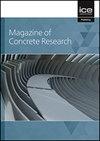使用硅灰和天然沸石提高污水处理厂混凝土的使用寿命
IF 1.8
4区 工程技术
Q3 CONSTRUCTION & BUILDING TECHNOLOGY
引用次数: 0
摘要
微生物攻击导致用于污水收集和处理设施的混凝土结构在短的使用寿命内迅速恶化和降解。因此,生产耐化学和硫酸腐蚀的混凝土具有更高的成本效益。在本研究中,共6种掺入7.5%硅烟(SF)和10%天然沸石(ZE)的混凝土混合料分别在最大pH值为2和1的0.5%和1%硫酸溶液中浸泡70周,以增强混凝土的抗酸侵蚀能力。定期监测试样的表面劣化、质量变化和破碎载荷变化。为了更好地了解混凝土混合料孔隙结构与抗硫酸性能之间的关系,进行了氯化物快速渗透、吸水率、电阻率和氯化物扩散系数等耐久性试验。在此基础上,通过火山灰反应将氢氧化钙(CH)转化为CSH凝胶,然后用硅灰和天然沸石精制混凝土孔隙率,可以有效提高混凝土抗低浓度硫酸侵蚀的能力。因此,使用SF和ZE是一种成本较低的方法,可以降低腐蚀速率,延长设施的使用寿命,特别是在低浓度的情况下。本文章由计算机程序翻译,如有差异,请以英文原文为准。
Increasing service life of concretes in sewage treatment plants using silica fume and natural zeolite
Microbiological attacks cause concrete structures used in wastewater collection and treatment facilities to deteriorate and degrade rapidly in short service lives. Hence, it is more cost-effective to produce concrete resistant to chemical and sulfuric acid corrosion. In the present study, a total of six concrete mixtures incorporating 7.5% silica fumes (SF) and 10% natural zeolite (ZE) were immersed in 0.5% and 1% sulfuric acid solutions with a maximum pH threshold of 2 and 1 respectively for 70 weeks to enhance concrete resistance to acid attack. The specimens were regularly monitored for surface deterioration, mass changes, and crushing load changes. To better understand the relationship between the pore structure of concrete mixtures and resistance to sulfuric acid, various durability tests such as rapid chloride penetration, water absorption, electrical resistivity, and chloride diffusion coefficient were performed. Based on the results obtained, it was concluded that converting calcium hydroxide (CH) into CSH gel through pozzolanic reactions and then refining the porosity of concrete with silica fume and natural zeolite was effective in enhancing the resistance of concrete to attack by sulfuric acid of relatively low concentration. As a result, using SF and ZE is a lower-cost method for reducing corrosion rates to extend the service life of facilities, particularly in lower concentrations.
求助全文
通过发布文献求助,成功后即可免费获取论文全文。
去求助
来源期刊

Magazine of Concrete Research
工程技术-材料科学:综合
CiteScore
4.60
自引率
11.10%
发文量
102
审稿时长
5 months
期刊介绍:
For concrete and other cementitious derivatives to be developed further, we need to understand the use of alternative hydraulically active materials used in combination with plain Portland Cement, sustainability and durability issues. Both fundamental and best practice issues need to be addressed.
Magazine of Concrete Research covers every aspect of concrete manufacture and behaviour from performance and evaluation of constituent materials to mix design, testing, durability, structural analysis and composite construction.
 求助内容:
求助内容: 应助结果提醒方式:
应助结果提醒方式:


